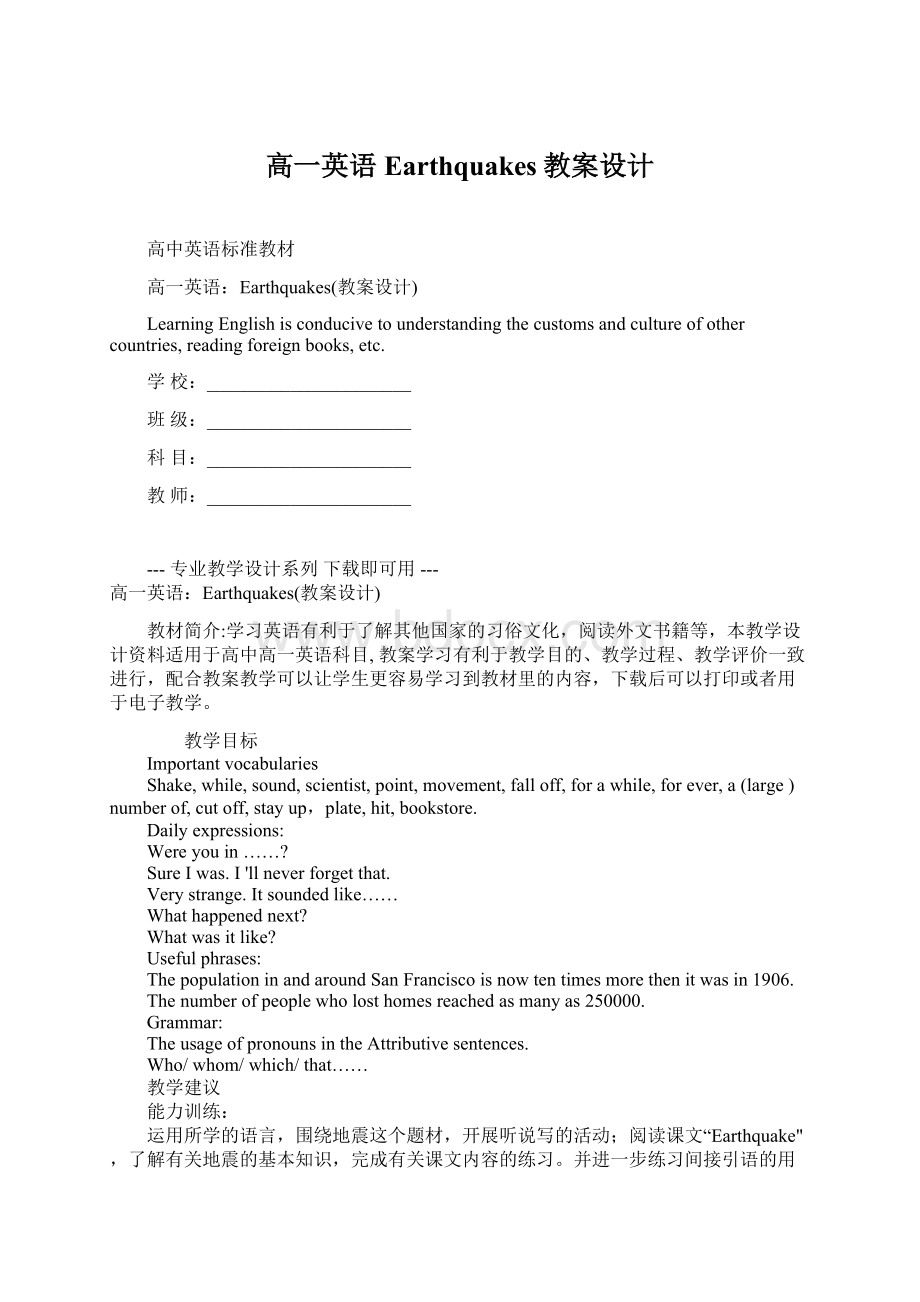高一英语Earthquakes教案设计.docx
《高一英语Earthquakes教案设计.docx》由会员分享,可在线阅读,更多相关《高一英语Earthquakes教案设计.docx(7页珍藏版)》请在冰豆网上搜索。

高一英语Earthquakes教案设计
高中英语标准教材
高一英语:
Earthquakes(教案设计)
LearningEnglishisconducivetounderstandingthecustomsandcultureofothercountries,readingforeignbooks,etc.
学校:
______________________
班级:
______________________
科目:
______________________
教师:
______________________
---专业教学设计系列下载即可用---
高一英语:
Earthquakes(教案设计)
教材简介:
学习英语有利于了解其他国家的习俗文化,阅读外文书籍等,本教学设计资料适用于高中高一英语科目,教案学习有利于教学目的、教学过程、教学评价一致进行,配合教案教学可以让学生更容易学习到教材里的内容,下载后可以打印或者用于电子教学。
教学目标
Importantvocabularies
Shake,while,sound,scientist,point,movement,falloff,forawhile,forever,a(large)numberof,cutoff,stayup,plate,hit,bookstore.
Dailyexpressions:
Wereyouin……?
SureIwas.I'llneverforgetthat.
Verystrange.Itsoundedlike……
Whathappenednext?
Whatwasitlike?
Usefulphrases:
ThepopulationinandaroundSanFranciscoisnowtentimesmorethenitwasin1906.
Thenumberofpeoplewholosthomesreachedasmanyas250000.
Grammar:
TheusageofpronounsintheAttributivesentences.
Who/whom/which/that……
教学建议
能力训练:
运用所学的语言,围绕地震这个题材,开展听说写的活动;阅读课文“Earthquake",了解有关地震的基本知识,完成有关课文内容的练习。
并进一步练习间接引语的用法。
师生互动活动:
Lesson25:
口头练习,对话交际功能-----日常生活用语的练习。
Lesson26---27:
听力和阅读相结合,理解全文的意思。
Lesson28:
口头和笔头练习相结合,写一篇关于地震的文章。
教材分析
本单元对话引出地震这个话题。
对话中提到了地震的时候的现象和人的感受。
本单元的阅读课文是了解发生在SanFrancisco地区的严重地震场景和有关地震发生时的基本常识。
同时在文章里有一些重要的语法知识,如定语从句的使用:
Awideandbusyroadwhichwasbuiltlikeabridgeoveranotherroadfellontotheonebelow.etc.
重点知识讲解:
1.Whatdoes"quake"means,asintheword"earthquake"?
像"earthquake"这个词中的quake是什么意思?
Asintheword"earthquake"是个省略结构,完整的说法为:
asitdoesintheword"earthquake".as在此为连词,表示“如“的意思。
Itsoundedlikeatrainthatwasgoingundermyhouse.那声音听起来就像有一列火车在我的房子底下开过似的。
sound为系动词,后接名词、介词短语做表语,意思是“听起来”。
Yourideasounds(like)agoodone.你的注意听起来不错。
Whathesaidsoundedlikeafairy-tale.他所说的话听起来就像神话故事。
表示“听起来像什么”的时候,用soundlike….。
like在此是介词表示“像”的意思。
类似于sound的常用系动词还有:
feel,taste,smell,look.
例如:
Cottonfeelsverysoft.棉花摸起来很柔软。
Itlookslikeabeautifulpicture.那看上去就像一幅美丽的画。
2.IwasinthekitchencookingsomethingandIfeltthefloormove.我当时正在厨房里作饭,我觉得地板动了一下。
cookingsomething在本句中为现在分词短语做伴随状语。
句中的move是省略了to的不定式,做宾语补足语。
动词feel的宾语补足语可以是动词原形,也可以是动词的ing形式或过去分词形式。
例如:
WhenIheardhiswords,Ifeltmyheartbeatingfaster.听了他的话,我感到心跳加快了。
Hefeltsomeoneknockatthedoor.他感到有人敲了一下门。
heboyfelthisbackpattedbysomeone.那个男孩子感到有人拍了他的脊背。
3.AndthenIwatchedalltheglassesonthetablefalloffontothefloor.后来我观察到桌子上所有玻璃杯子掉到了地板上。
辨析:
falloff/falldown
falloff表示“从。
。
。
。
上落下或掉下”。
off为介词或副词。
falldown的意思是“倒塌、掉下”,不强调落物的来处。
例如:
Isawhimfalloffhishorse.我看到他从马上掉了下来。
Flowersfellofftotheground.花儿凋谢了,落到了地上。
Autumncomesandleavesarefallingoffthetrees.秋天到了,落叶纷纷。
Astonefelldownintheearthquake.一块石头落了下来,砸中了他。
Theoldhousefelldownintheearthquake.老房子在地震中倒塌了。
4.Agreatpartofthecitywasdestroyedandalargenumberofbuildingswereburnt.城市的大部分地区被摧毁,许许多多建筑物被火吞噬。
Anumberof相当于many.意思为“许多”,后跟可数名词的复数形式。
短语中的number前可以由large/small来修饰,构成alarge/great/smallnumberof短语。
例如:
1)Anumberofpeoplewerekilledinthetrafficaccident.有许多人在那场车祸中丧生。
2)AlargenumberofstudentswenttoseeMr.Zhangwhenhewasill.张老师生病的时候有许多的学生去看望他。
Onlyasmallnumberofpeopleareagainstthisplan.只有少数人反对这个计划。
辨析:
anumberof/thenumberof
anumberof意思为“许多”。
中心词为of后面的复数形式。
thenumberof的意思为“…的数量”,中心词为number,因此,“thenumberof+复数名词”,做主语时谓语动词为单数第三人称形式。
例如:
Thenumberofbooksinourlibraryisgoingup.我们图书馆里的藏书数量正在上升。
Thenumberofthestudentsinourclassis57.我们班的学生人数为57人。
Anumberofstudentsareplayingfootballontheplayground.许多的学生在操场上踢足球。
5.Thenumberofpeoplewholosthomesreachedasmanyas250000.无家可归的人数达到25万。
短语“asmanyas”意思为“和…一样多,多达”,修饰可数名词;asmuchas与asmanyas意思相同,但是修饰不可数名词。
类似的表达法还有:
aslongas长达ashighas高达aswideas宽达
Thegreatfireburneddownasmanyastwentybuildings.那场大火烧毁的房屋达到20之多。
Helostasmuchas1000yuan.他丢的钱多达1000元。
Thefilmlastsaslongastwohours.这部电影长达2个小时。
Themountainreachesashighas2000metres.那座山高达2000米。
Theroadisaswideas10metres.这条路宽达10米。
6.辨析:
as/when/while
这三个词都有“当……的时候”的意思。
但用法稍有不同。
as强调“一边……一边……”或是“与……同时,侧重表示主句的动作同时发生。
when既可以表示时间地点也可以表示时间段。
while只表示时间段,不表示时间点。
它后面必须是延续性的动词,而且多为进行时态。
当从句的谓语的动词为延续性动词时三者都可以替换使用。
例如:
WhenIgothome,hewashavingsupper.我到家的时候,他正在吃晚饭。
IlikeddancingwhenIwasyoung.我年轻时喜欢跳舞。
Theytalkedastheywalked.他们边走边谈。
Athiefbrokeinas/while/whenIwassleeping.在我睡觉的时候小偷闯了进来。
While/When/Aswewerestilllaughing,theteachercamein.当我们仍还在大笑,老师进来了。
Striketheironwhileitishot.趁热打铁。
8.Awideandbusyroadwhichwasbuiltlikeabridgeoveranotherroadfellintotheonebelow,.Manypeoplewerekilledintheircars,butafewluckyoneswerenothurt.一座以立交桥车辆川流不息的马路塌陷到桥下面的路面上。
很多人被压死在自己的车里,但是也有少数幸运的人没有受伤。
这两个句子中one(s)是代词,用来代替或是避免重复上文提到的名词。
one只可替代可数名词,其复数形式为ones.第一句中的one代替road,第二句中的ones代替people。
例如:
Iftheearthquakeisabigone,agreatpartofthecitywillbedestroyed.如果那是个大地震的话,城市的大部分地区将要被毁掉。
Iwouldlikeapoundofapples,theredones.我要一英镑苹果,红苹果。
Hehadnoexcuseforhisbeinglate,buthehadtofineone.他迟到找不着借口,但是他必须找一个。
Ifyoudon'tlikethesecups,Ihaveotherones.要是你不喜欢这些杯子,我还有别的。
9.Third,youmustmakethehousesasstrongaspossible.第三,应该把房屋建的尽可能结实。
As…aspossible是个固定搭配,中间可加形容词或副词,意思为“尽可能的…”。
例如:
Hehadhisbreakfastasquicklyaspossible.他尽可能快的吃了早饭。
Pleasecomeasearlyaspossibletomorrow.明天请尽可能早来。
Theykeeptheclassroomascleanaspossible.他们尽可能的保持教室清洁。
12.Weakbuildingswillfalldowninanearthquake,butstrongonesmaystayup.不结实的建筑物会在地震中倒塌,而结实的建筑物则可能安然无恙。
短语stayup的意思是“挺立,站立,熬夜”等。
例如:
Youmuststayupintimeofdifficulty.困难面前你必须要挺住。
Hestayedupallnight.他通宵未睡。
Hehasbeenworkingforalmostawholeday,buthecanstayup.他干了快一整天了,但是还是挺得住。
10.time表示倍数的用法
在此句中表示倍数,其前面的数词用基数词。
常用的倍数表示法有以下几种:
1.Aisthree(four/five….)timesbigger(more/longer/higher….)thanB.A比B大(多/高/长…)三(四/五…)倍。
例如:
Thenewbridgeisthreetimeslongerthentheoldone.新桥比旧桥长三倍。
Atleastthetrainrunssixtimesfasterthentheboat.火车的速度至少比小船快6倍。
Themeeting-roomisfourtimesbiggerthanours.这个会议室比我们的大四倍。
2.Aisthree(four/five…)timesasbig(much/many/long/high…)asB.A比B大(多/长/高。
。
。
)两倍或者是A是B的三(四/五……)倍大(多/长/高……)
例如:
LineAisfivetimesaslongasLineB.线段A比线段B长四倍。
(或是线段A是线段B的五倍长)
AsiaisfourtimesaslargeasEurope.亚洲比欧洲大三倍。
Thisbuildingisthreetimesashighasthatone.这栋楼房比那一栋高2倍。
3.Aisthree(four/five….)timesthesize(amount/length/height…)ofB.A比B大(多/长/高……)两(三/四……)倍或是A是B的三(四/五……)倍大(多/长/高……)。
例如:
LineAisfourtimesthelengthofLineB.线段A比线段B长四倍。
Thisbuildingisthreetimestheheightofthatone.这栋楼房比那栋高2倍。
如果表示“A比B大(多/长/高。
。
。
)一倍“用twice,而且用第一种表示法。
例如:
BobistwiceheavierthanJack.鲍博比杰克重一倍。
Thisroadistwicelongerthanthatone.这条路比那条路长一倍。
11.语法——定语从句
关系代词who,whom,that和which引导的定语从句。
在句子中修饰名词或代词的从句为定语从句。
定语从句所修饰的词叫先行词,定语从句一般修饰跟在先行词的后面。
如果先行词指人,关系代词可用who,whom,that.如果先行词指物,关系代词可用which或是that。
关系代词who,whom,that和which既起连接作用,又在定语从句中充当一定成分(在定语从句中作主语或是宾语)。
关系代词在从句中作宾语时常常可以省略,但是作主语时不能省略。
Whom在从句中作宾语时用,但是在口语或非正式文体中,常用who来代替whom。
例如:
Aplaneisamachinewhich/thatcanfly.飞机是会飞行的机器。
Thebook(which/that)youwantisonmydesk.你要的那本书在我的书桌上。
Anybodywho/thatbreakstherulesispunished.任何违反规定的人都要受到惩罚。
Theboywho/thatlikesskatingwillbehere.喜欢滑冰的那个男孩子将会来这里。
Thegirl(who/whom/that)youmetinthestreetisJohn’ssister.你在大街上遇到的那个女孩是约翰的妹妹。
Isthisthelady(whom)youspokeof?
这个是你谈到的那位女士吗?
教学设计方案:
Lesson25一、TeachingAims
Helpthestudentshavefreetalkaboutwhatanearthquakeisandwhatpeopleusuallyfeelwhenanearthquakehappens.
PractiseinpairsontalkingabouttheearthquakethathappenedinSanFranciscoin1898.
Studythelanguageitemsinthelesson.
Dotheexerciseonpage25abouttheindirectspeech.
二、Teachingprocedures
Step1Warming-up
AsktheSssomequestionsaboutearthquake,suchas,“Whatwillhappenwhenanearthquakehappens?
”“Whatcausesanearthquaketohappen?
”“Whatshouldpeopledowhenanearthquakehappens?
”etc.
Step2.Listening
TheSsaresupposedtolistentothetapeabouttheearthquakethathappenedinSanFranciscoin1989.
AfterlisteningtothedialoguetheSsaresupposedtodotheexercisesonpage87.Exx.1.
WhatareCarlandWangBingtalkingabout?
WherewasCarlatthetimeoftheearthquake?
HowdidCarlfeelwhentheearthquakewashappening?
Step3.Practising
Thestudentsaresupposedtodothepairworkonpage25.
ChangethesentencesintoIndirectSpeech.
Step4.Languagepointsofthedialogue
as的用法
sodoyou形式的复习
atthetimeof的用法
itsoundedlike中sound的用法
feelsth.do的用法
6.falloff和falldown的辨析
quiteawhile的用法
Step5.Practising
Iftimeispermitted,thestudentsaresupposedtodotheexerciseonpage87.Exx.2---retellthedialogue.
教学设计方案:
Lesson26
TeachingAims
TheSsaresupposedtogettheideawhattheearthquakeislikewhenitishappeningandwhatcausesanearthquaketohappen?
LearnhowtowriteacompositionaboutanearthquakethathappenedinTangshan,Chinain1976.
Teachingprocedure
Step1.Askthestudentssomequestionsaboutearthquakes.
Haveyoueverheardanythingaboutearthquakesfromyourparents?
Haveyoueverbeeninanyoftheearthquakes?
Whereandwhen?
DoyouknowthebiggestearthquakethathappenedinChina?
Step2.Readingthetext
Forthefirsttimeofreading,theSsa